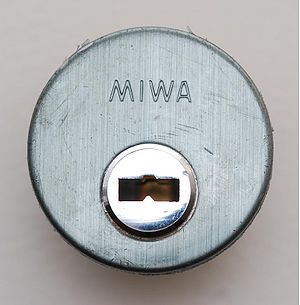Magnetic lock: Difference between revisions
(Created page with '=Magnetic locks= thumb|right|300px|text-top|The [[MIWA EC magnetic lock.]] A '''magnetic lock''' is a lock design that uses magnetism to properly …') |
m (PageName/TOC fix) |
||
| Line 1: | Line 1: | ||
= | |||
<span style="font-size: 188%;">{{PAGENAME}}</span> | |||
---- | |||
[[File:MIWA_EC_lock.jpg|thumb|right|300px|text-top|The [[MIWA EC]] magnetic lock.]] | [[File:MIWA_EC_lock.jpg|thumb|right|300px|text-top|The [[MIWA EC]] magnetic lock.]] | ||
Latest revision as of 15:38, 19 December 2022
Magnetic lock

A magnetic lock is a lock design that uses magnetism to properly position locking components and prevent opening of the lock. Many magnetic locks use cylinders that require components to be positioned at the shear line, others interact directly with the bolt. Mechanical and electronic locks that use a magnetic component to secure a door strike are not typically classified as magnetic locks.
Though patents for magnetic locks stretch back to the 1800s, they were not historically popular due to their low number of differs, expense in manufacturing, and relative difficulty in mass-producing small, powerful magnets. Modern advances in these fields have generated a number of magnetic lock designs, some of which are included in modern high security locks.
History
Add to me!
Principles of operation
Add to me!
Vulnerabilities
Unlike traditional lock designs, most magnetic locks do not offer direct access to the locking components. This gives them defense against a variety of traditional attacks regardless of the design of the lock. For example, impressioning techniques are not possible with most magnetic locks. Decoding is the preferred method of attack against most magnetic locks. Magnetic locks may be vulnerable to one or more of the following: